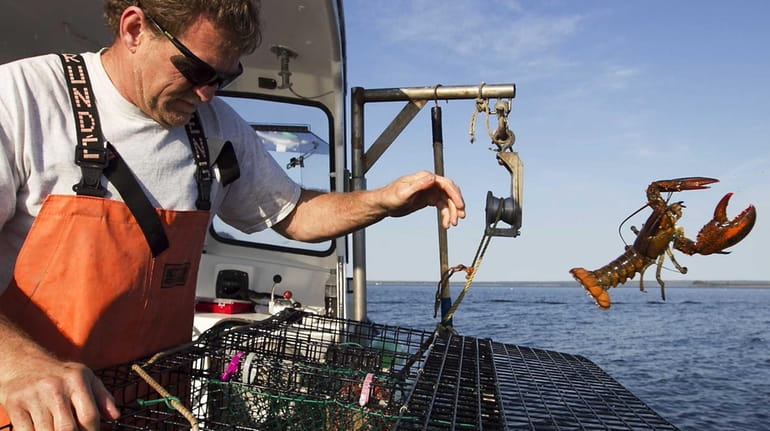Federal report: Local lobster population 'severely depleted'

A fisherman in Maine returns an undersized lobster on May 21, 2013. Fishermen in northern New England have been catching record numbers of lobsters, but south of Cape Cod, the lobster population has plummeted to the lowest levels ever seen. Credit: AP / Robert F. Bukaty
Local lobstermen say they are bracing for further restrictions in the wake of a new federal report describing regional lobster populations as "severely depleted."
Lobsters in the Long Island Sound and the entire Southern New England fishery are "in need of protection," said the Atlantic States Marine Fisheries Commission, a federal fisheries regulator.
The findings, which were released this month, come even after two years in which the Long Island Sound has been off-limits for lobster fishing from Sept. 8 to Nov. 28, a historic closure designed to reduce the harvest by 10 percent.
New York commercial lobster boats landed just 112 metric tons of lobsters in 2013, a record low, compared with the 4,268 metric tons landed in 1996, the report states. New Yorkers had just 21,127 lobster traps in the water in 2013, down from 346,729 in 1998.
The number of commercial lobster permits issued in the state in 2013 also was at an all-time low of 326, compared with a high of 1,265 in 1994, according to the report.
The report suggests further measures may be needed to protect the declining local lobster population, which it suggests may be migrating north to colder waters.
"Closer scrutiny reveals the inshore portion of the Southern New England stock has clearly collapsed," said the report, which found that the stock is "clearly overfished."
The report said a "longer and more geographically widespread harvest moratorium would be necessary to increase spawning stock abundance enough to boost recruitment and allow the stock to rebuild."
John German, president of the Long Island Sound Lobstermen's Association, said the report suggests that fisheries managers may extend the existing closure to reduce the harvest.
"I don't agree with it," said German, one of three lobstermen working from Mount Sinai Harbor, where 14 boats used to fish.
Emerson Hasbrouck, marine program director for the Cornell Cooperative Extension in Riverhead, and an Atlantic States Marine Fisheries commissioner, noted the debate about whether curtailing trapping will have an impact.
"It's a tough situation," Hasbrouck said. "The environmental effects have such an impact on the resource. Will restricting fishing effort further have a positive effect? I don't know."
German said he believes an abundance of predatory fish is causing the lobster population to decline, and believes an easing of the quotas on black sea bass, whelk and striped bass, which prey on baby lobsters, would help more lobsters survive to adulthood.
A spokesman for the state Department of Environmental Conservation, which implements and enforces local fishing rules, didn't return a call for comment.


